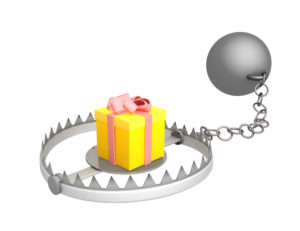 For those who grew up enjoying Christmas holidays, it can be hard to imagine the winter season without them. Every end of the year comes with glitter-festooned pageantry, complete with frankincense, gold, melodic carols, storytelling and sparkling lights, while scented with a mix of peppermint, cinnamon, sage, chocolate and a host of other aromatic delights. Yet, it’s sometimes easy to forget that Christmas was not always revered. If you could take a trip back in time to the nascent American colonies, you might be surprised by our early settlers’ attitudes towards this now ubiquitous holiday.
For those who grew up enjoying Christmas holidays, it can be hard to imagine the winter season without them. Every end of the year comes with glitter-festooned pageantry, complete with frankincense, gold, melodic carols, storytelling and sparkling lights, while scented with a mix of peppermint, cinnamon, sage, chocolate and a host of other aromatic delights. Yet, it’s sometimes easy to forget that Christmas was not always revered. If you could take a trip back in time to the nascent American colonies, you might be surprised by our early settlers’ attitudes towards this now ubiquitous holiday.
Rowdy, Raucous Reveries in Merry Old England
Many people are already aware that some Christmas traditions came from pagan customs. However, you might not know that celebrations in the 17th century didn’t exactly conform to the pious ideals held by Christians of the period. Festivities in the early 1600s more closely resembled Mardi Gras or ancient Roman Saturnalia feasts than our contemporary home-grown observances that are often focused on food, worship and family. According to History.com, getting into “the holiday spirit” often involved public drinking, gambling and lewd behavior.
Christmas Banned During the English Civil War
Meanwhile, tensions between supporters of England’s parliament and loyalists to the country’s monarchy eventually broke out into the English Civil War, which lasted between 1642 and 1651. The parliament-backing “Roundheads” led by politician Oliver Cromwell counted extremist Puritans among their numbers, and BBC History Extra adds that they included their umbrage against public Christmas observances in their litany of grievances.
During this period, Cromwell’s supporters saw opportunities to enact their desired social changes. In 1644, a public proclamation by the nation’s Puritan-majority parliament mandated citizens to fast instead of feast, declaring that the holiday was “pretending [to] the memory of Christ” but had transmuted into “an extreme forgetfulness of him, by giving liberty to carnal and sensual delights.” Royalists also used the holiday as a battleground, with some staging pro-Yule riots in December 1647. Once King Charles II took the throne in 1660, he ended all prior bans on celebrating Christmas.
Puritan Contempt for Christmas in North America
When Puritans arrived in North America, they brought their anti-Christmas sentiments with them. A Telegraph article on the subject discloses that Massachusetts Bay officials mirrored the actions of their Cromwellian counterparts by outlawing the holiday in 1659, claiming that it was both too “Catholic” and heavily influenced by pagan traditions. LiveScience further explains that Boston’s government classified public Christmas celebrations as criminal offenses. Violations could earn you a five-shilling fine until 1681, when the Massachusetts Bay Colony finally repealed the ordinance.
Nevertheless, it wasn’t just old political resentments or a disapproval of unruly merrymaking that turned the Puritans against Yuletide. Quoting from Stephen Nissenbaum’s book “The Battle for Christmas,” History.com contributor Christopher Klein elucidates that they strove to create a society governed by a Biblically based legal code. Since there is no mention of the exact date on which Jesus was born nor are there any commandments in the Bible for Christians to commemorate his birth, the Puritans were not motivated to participate in any sort of Nativity celebrations. Furthermore, they viewed Christmas itself as the Catholic Church’s co-opting of older Roman holidays. Thus, early Massachusetts Bay settlers would have considered it a violation of the Bible’s repeated warnings against observing pagan customs.
Christmas Wasn’t Always Considered “Christian”
As English and American histories prove, Theodore Geisel’s furry green curmudgeon isn’t the only one who’s stolen Christmas in time past. Strict theological leanings, political intrigue and moralistic disdain prompted Puritans in England and the United States to pull the plug on it. With these fascinating aspects of our country’s early history, debates about a perceived “war on Christmas” take on a whole new meaning.

